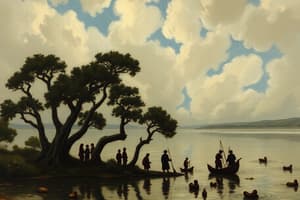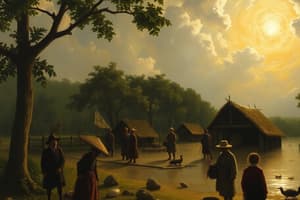Podcast
Questions and Answers
Who is most famously associated with the period of exploration in the New World?
Who is most famously associated with the period of exploration in the New World?
- John Cabot
- Christopher Columbus (correct)
- Hernán Cortés
- Amerigo Vespucci
Which European nation was among the first to establish colonies in the New World?
Which European nation was among the first to establish colonies in the New World?
- Portugal (correct)
- France
- England
- The Netherlands
What was the primary motivation for Europeans to explore the New World?
What was the primary motivation for Europeans to explore the New World?
- Discover new lands and untold riches (correct)
- Establish political alliances
- Spread their culture
- Promote religious tolerance
Which explorer significantly added to the geographic knowledge of the Americas during the period of exploration?
Which explorer significantly added to the geographic knowledge of the Americas during the period of exploration?
How did the arrival of European explorers impact the indigenous populations of the Americas?
How did the arrival of European explorers impact the indigenous populations of the Americas?
Which region did explorers NOT discover during this period of exploration in the Americas?
Which region did explorers NOT discover during this period of exploration in the Americas?
What new systems did colonization introduce to the Americas?
What new systems did colonization introduce to the Americas?
What effect did European diseases have on indigenous populations?
What effect did European diseases have on indigenous populations?
How did the colonizers assert dominance over indigenous populations?
How did the colonizers assert dominance over indigenous populations?
What resources were extracted from the Americas due to economic expansion during colonization?
What resources were extracted from the Americas due to economic expansion during colonization?
How did colonization impact indigenous lands?
How did colonization impact indigenous lands?
Which Native American group successfully resisted European expansion for more than a century?
Which Native American group successfully resisted European expansion for more than a century?
Flashcards are hidden until you start studying
Study Notes
Delving into the New World: Exploration, Colonization, and Indigenous Impacts
The New World, a vast expanse encompassing the Americas, was catapulted into global consciousness through a series of exploration and colonization efforts that spanned centuries. To explore the intricacies of this dynamic and complex period, let's delve into its three central themes—exploration, colonization, and the impact on indigenous populations.
Exploration
The allure of untold riches and the promise of new lands ignited a spirit of exploration among Europeans. Christopher Columbus, the figure most famously associated with this period, set sail in 1492 to seek a western route to Asia, ultimately landing in the Bahamas. His voyages marked the beginning of a major shift in global dynamics, as they opened up the Americas to European eyes.
Explorers such as Amerigo Vespucci, John Cabot, and Hernán Cortés significantly added to the geographic knowledge of the continent, paving the way for the colonization that would follow. These explorers discovered diverse landscapes, from the vast grasslands of the prairies to the dense rainforests of the Amazon, and the frozen tundra of the far north.
Colonization
As knowledge of the New World grew, European nations began to establish colonies. Spain and Portugal, the first to arrive, were followed by France, England, and the Netherlands. Colonization introduced new political, economic, and social systems to the Americas, as the settlers sought to exploit the land and its resources.
The colonizers established large plantations, mines, and trading centers, which led to the exploitation of indigenous labor and the introduction of enslaved Africans. This economic expansion facilitated the extraction of resources such as gold, silver, sugar, and tobacco, which strengthened the economies of Europe and fueled global trade.
Impact on Indigenous Populations
The arrival of Europeans in the Americas led to profound transformations in the lives of indigenous peoples. Many indigenous groups were decimated by European diseases, which had no natural resistance among the native populations. Smallpox, measles, and influenza ravaged their communities, causing an estimated decline of more than 90% in some regions.
Additionally, the colonizers asserted their dominance over the indigenous populations through military force, slavery, and the destruction of their cultural heritage. Indigenous lands were seized to make way for the colonists' farms, mines, and cities, leading to the fragmentation of indigenous territories and the disruption of their traditional ways of life.
Despite the hardships, indigenous peoples fought back against the colonization of their lands, preserving elements of their cultures and languages. For instance, the Iroquois Confederacy, a group of five Native American nations, successfully resisted European expansion for more than a century, and their political structure continues to serve as a model for democratic governance.
Conclusion
The New World, a stage for exploration, colonization, and the transformation of indigenous populations, remains a subject of fascination and debate. As we reflect on the interconnectedness of these themes, it is essential to consider the impact of the events of the past on the present and to strive for a more equitable future. By acknowledging the mistakes of the past and embracing the lessons learned, we can work towards a more inclusive and just world.
Sources: Crosby, A. W. (1972). Ecological Imperialism: The Biological Expansion of Europe, 900-1900. Cambridge University Press. Deloria, V. (1999). Playing Indian: The Image of the Indian in the American Mind. Fulcrum Publishing.
Studying That Suits You
Use AI to generate personalized quizzes and flashcards to suit your learning preferences.




